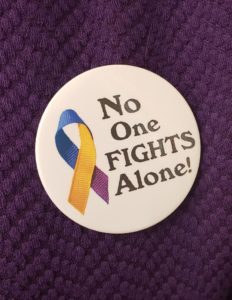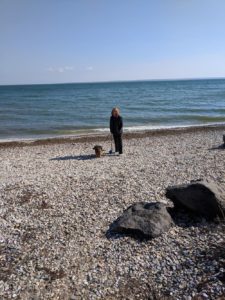Coping | Daily Life | Ostomy
 There were two words to describe me as I went through bladder cancer treatment and my resulting urostomy: Hot Mess. As you can imagine, there are a host of feelings that come with a cancer diagnosis. You often hear about the stages of grief and loss: denial, anger, bargaining, depression, and acceptance. People grieve differently and stages vary in length and order, but the Kubler-Ross Model, as this is officially known, is pretty accurate. Knowing I would be dealing with the emotions of having cancer did not come as a surprise. What did surprise me was the emotional turmoil I experienced as a result of having a urostomy.
There were two words to describe me as I went through bladder cancer treatment and my resulting urostomy: Hot Mess. As you can imagine, there are a host of feelings that come with a cancer diagnosis. You often hear about the stages of grief and loss: denial, anger, bargaining, depression, and acceptance. People grieve differently and stages vary in length and order, but the Kubler-Ross Model, as this is officially known, is pretty accurate. Knowing I would be dealing with the emotions of having cancer did not come as a surprise. What did surprise me was the emotional turmoil I experienced as a result of having a urostomy.
Anxiety can have many symptoms, both emotional and physical, such as insomnia, GI issues, high blood pressure, increased heart rate, loss of appetite, fatigue, inability to concentrate, etc. When I was diagnosed with cancer, I experienced many of these. I also developed shingles. My doctor said there was definitely a connection between their development and stress. As a result of my shingles, I was put on Venlafaxine, an anti-anxiety medication. I am always concerned with medicine side effects so we started with as small a dose as possible. While it did not totally eradicate my anxiety, it took the edge off. I did not experience as many debilitating low points. I have since discontinued it.
What really helped me was exercise and my friends. My one friend, in particular, let’s call her Patt (because that is her name), was there for me every day. We walked almost daily, sometimes 7 miles at a time. The benefits of this were two-fold. The first was it allowed me to be physically fit for my surgery. Even more beneficial was that I was able to get out of my head. We talked…a lot. Sometimes I cried and we would have to stop. I was then able to get a hold of my emotions and we would get back on the road again. This was so therapeutic and something I continue to do to this day.
My lowest point was when I learned my immunotherapy treatment did not work and I would need a urostomy. Ironically, this was the best chance I had of being cured but it was the thing I wanted the least. Early in the process, I asked the doctor what would happen if I did not get the surgery and he said I would die. Needless to say, I agreed to the surgery. At this point, I started to accept the idea of getting a urostomy, or so I thought. The news was actually devastating. I thought I would be a freak. I was scared, and honestly, had no concept of what to expect. I cried all the time. I could not talk about my future. As the date for my surgery, and the inevitable, approached, I finally started to help myself. And this is one of the biggest lessons I learned: knowledge is power.
 When I had no frame of reference, I feared the unknown. As I learned more of what having a urostomy would entail, I became less frightened and sad. I sought out information from BCAN, the Bladder Cancer Advocacy Network, and, through them, was able to reach out to people who had similar experiences. From them, I learned that things were not so bad. My life would essentially be the same. Through my hospital, I took a class where I was able to learn about pre and post-operation information as well as handle ostomy supplies. The more I learned, the braver and more accepting I became. By the day of surgery, I was ready.
When I had no frame of reference, I feared the unknown. As I learned more of what having a urostomy would entail, I became less frightened and sad. I sought out information from BCAN, the Bladder Cancer Advocacy Network, and, through them, was able to reach out to people who had similar experiences. From them, I learned that things were not so bad. My life would essentially be the same. Through my hospital, I took a class where I was able to learn about pre and post-operation information as well as handle ostomy supplies. The more I learned, the braver and more accepting I became. By the day of surgery, I was ready.
There have been bumps along the way. In the beginning, when I was trying to find the right equipment and was experiencing many more leaks, I would become distraught. With the help of my ostomy nurse, I was able to get through. Sometimes, especially when I am attaching my night bag, I am overwhelmed by the permanence of everything. This is now my life, forever. That can be daunting but, after a full night’s sleep (thanks to that same night bag), I am fine. Sometimes, I like to throw myself a big pity party. I feel sorry for myself, get mad, cry, etc, then move on. There are people who have it so much harder than I do. There are infants who have urostomies. If they can do it, I sure can.
There came a time when I was tired of talking about my problems with my family and friends. I am sure they were tired of it too. I called the hospital where I had my surgery and asked for a referral to a counselor. I was told there was a six-month wait. At the time, there was no way I could wait that long. I then called Dana Farber, where I went for my cancer treatment. While they did not have a counselor I could talk to, they recommended I use the Psychology Today Therapist Finder. I was able to put in my location and what I was looking for in a counselor. In my case, I wanted someone who worked with cancer patients. I was even able to narrow it down to who took my insurance. Counseling was truly cathartic. I got to pay someone to listen to me. They HAD to listen to me. It was a dream come true. In all seriousness, it truly helped. I was able to express my fears and learned to deal with them.
Finally, one of the most satisfying ways I have found to deal with my cancer and urostomy is by helping others. I have become a patient advocate and mentor to others as they helped me through BCAN’s Survivor to Survivor program. I also volunteer with United Ostomy Association of America (UOAA) and even wrote this blog. Each of those things, while helping others, also help me. It affirms the knowledge that everything is really ok.
Throughout this process, there has been very little I have had control over. What I can control is how I choose to react to these challenges. From the start, I chose to change my own bag. I did everything I could to get healthy. I went back to work as soon as I was able. Through talking, learning, exercising, helping others, and yes, a little medication, I am no longer a hot mess.
Annemarie Finn is a married mother of three and the proud grandmother of one grandson. She is a teacher at Mashpee Middle High School in Mashpee, MA on beautiful Cape Cod. She was diagnosed with bladder cancer in July 2018. Immunotherapy was unsuccessful and she received a radical cystectomy with an ileal conduit (Urostomy) in January 2019. Until her diagnosis, she had never heard of an ostomy and was overcome with a fear of the unknown.
As is often the case, she discovered that things were not as bad as she imagined. She is able to do everything she did before and, most importantly, remains cancer free. Because of her experience and her passion for teaching, she has committed herself to empowering others through education and telling her story. She is the co-chair of the United Ostomy Association of America Education Committee, a mentor with the Bladder Cancer Advocacy Network’s Survivor to Survivor program and a patient advocate for ASCO, the American Society of Clinical Oncology.
